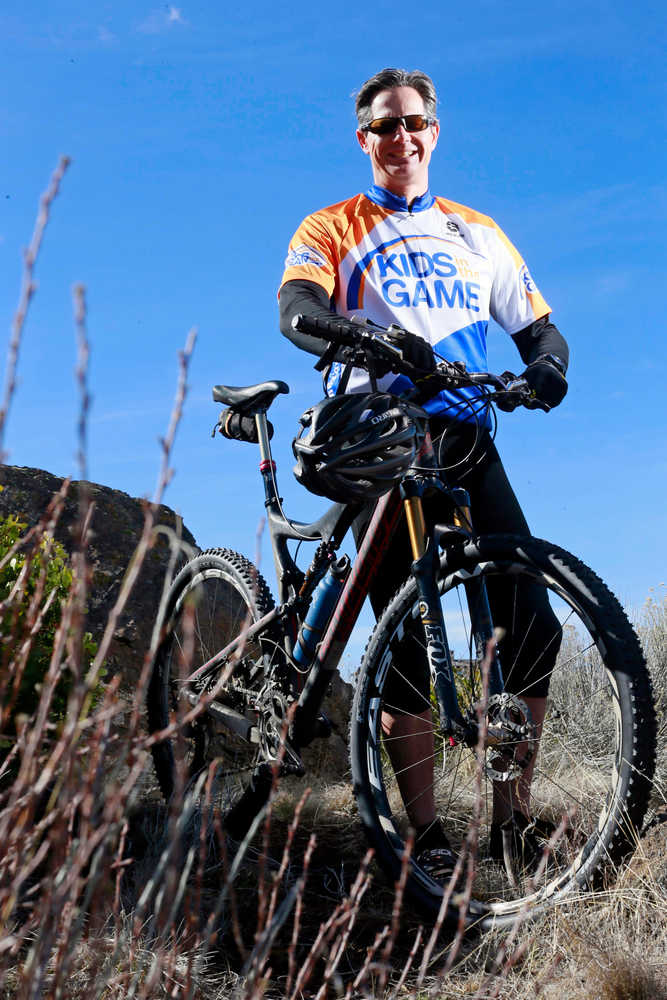BEND, Ore. — It has been called the Tour de France of mountain bike stage races. The eight-day Cape Epic in South Africa spans nearly 500 miles and includes 50,000 feet of elevation gain in temperatures that can soar above 100 degrees.
Even the best have succumbed to the grueling challenge of the annual Cape Epic. Adam Craig, an Olympic mountain biker from Bend, could not finish the race in 2012 due to severe dehydration stemming from a stomach issue.
“The party line at the Epic is SURVIVAL,” Craig wrote in his blog shortly after pulling out of that race. “It’s what the eventual winners are doing just as much as the poor blokes that are out there for 10 hours per day, every day, surviving. It’s a serious test of being.”
Bend’s Brian Grossman is intent on being one of those “poor blokes.”
You see, the Cape Epic is not just for seasoned pros like Craig, 32, who happens to be one of the strongest mountain bikers in America. Recreational riders like Grossman, 48, can also register for the race, which includes 1,200 cyclists competing in two-rider teams.
Grossman is racing the Cape Epic later this month to raise funds and awareness for Kids in the Game, a Bend nonprofit he co-founded that provides financial support for underprivileged youths to help them get active and participate in sports.
Two years ago, Grossman completed the Marathon Des Sables, a seven-day running race in the Sahara Desert of Morocco that was his first such effort in support of Kids in the Game. Recharged and motivated, he has been training since July for the Cape Epic, which he says has been on his bucket list for more than eight years.
Grossman raised more than $50,000 for Kids in the Game through the Marathon Des Sables, and now his goal is to raise $48,720 — $1 for every foot of vertical gain in the Cape Epic.
Grossman says he is “more afraid” of the Cape Epic than he was the Marathon Des Sables. His goal for the mountain bike race is simply to survive and finish.
“I’m not a fast guy, but I can go all day,” he says. “But there are time cutoffs with this race. The challenge for me will be making those cutoffs. I’ll need to be stronger than I’ve ever been as a rider. The mental, emotional side of it, it’s no time to have any moments of weakness or doubts in your head.”
Grossman will ride with teammate Tom Turley, a friend from Denver with whom he has taken on numerous mountain biking and mountaineering adventures. Turley — who Grossman says has participated in the Running of the Bulls in Pamplona, Spain, 26 times — is certainly crazy enough to attempt the Cape Epic.
“I wanted somebody who’s a stronger rider than I am,” Grossman says of Turley, also 48. “It was hard to find somebody who was willing to do it and capable of it.”
Grossman and Turley, who will compete in the Masters 40-50 category, figure to be two of the older riders in the event.
The Cape Epic has been redesigned each year since its inception in 2004. The race takes bikers through unexplored landscapes and breathtaking vistas along dirt roads and singletrack throughout Western Cape, South Africa. Teammates must stay within two minutes of each other as a safety precaution during the stage race. Riders in the Cape Epic average about 60 miles per day.
It is a full-service race, meaning a crew will provide food, water and tented race villages for the mountain bikers throughout the event. Riders sleep in tents each night after completing that day’s stage.
Grossman, a stepfather of two who has worked as a lawyer and a software entrepreneur, has stayed relatively fit since completing the Marathon Des Sables. But he admits he needed to get into prime cycling form for the Cape Epic, which he decided more than a year ago that he would race.
He says he has dropped his weight from 212 pounds to 186 through a combination of running, road biking, mountain biking, power pilates, and riding a trainer in his garage. He has also been using a fat bike, which has much wider than normal tires to handle the snow and mud of Central Oregon winters.
Grossman has made two trips to Northern California this winter to train in fairer weather. He focused on logging long days with lots of climbing in the Santa Cruz Mountains.
“The number one challenge is that I’m a slow climber,” Grossman says. “If I’m able to climb at 4 miles an hour, versus 3 miles an hour, that could be the difference between making it and not making it. If we’re behind, we’ll have to take risks on descents. But our goal is to survive and have some fun with it.”
Although laser-focused on his training and preparation, Grossman has never lost sight of his main motivation for undertaking the Cape Epic. He says Kids in the Game, now operating in 22 states, has helped provide access to sports programs for more than 5,300 kids — 2,100 of whom live in Central Oregon.
“The ultimate goal,” Grossman says, “is the impact we can have on these kids.”
Information from: The Bulletin, http://www.bendbulletin.com

